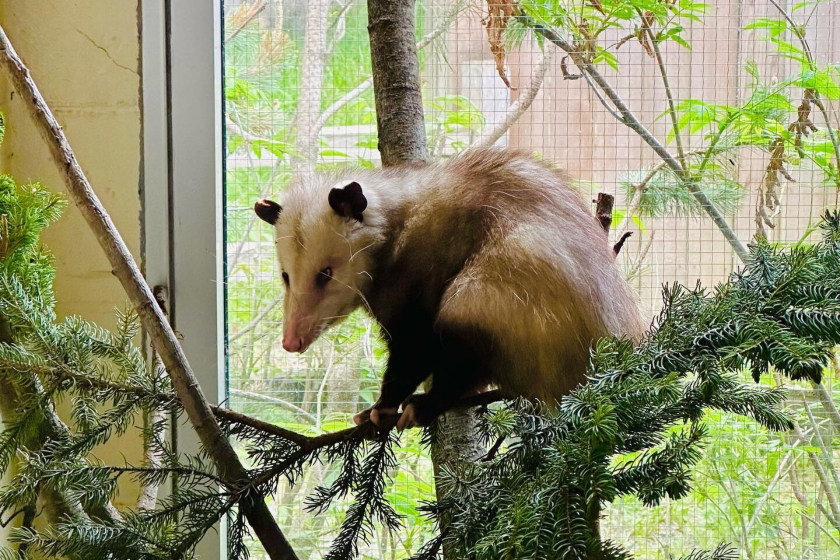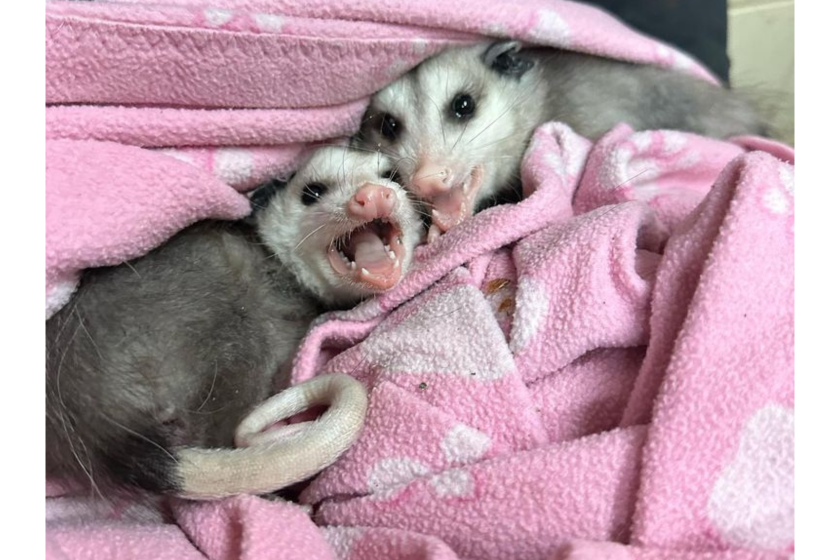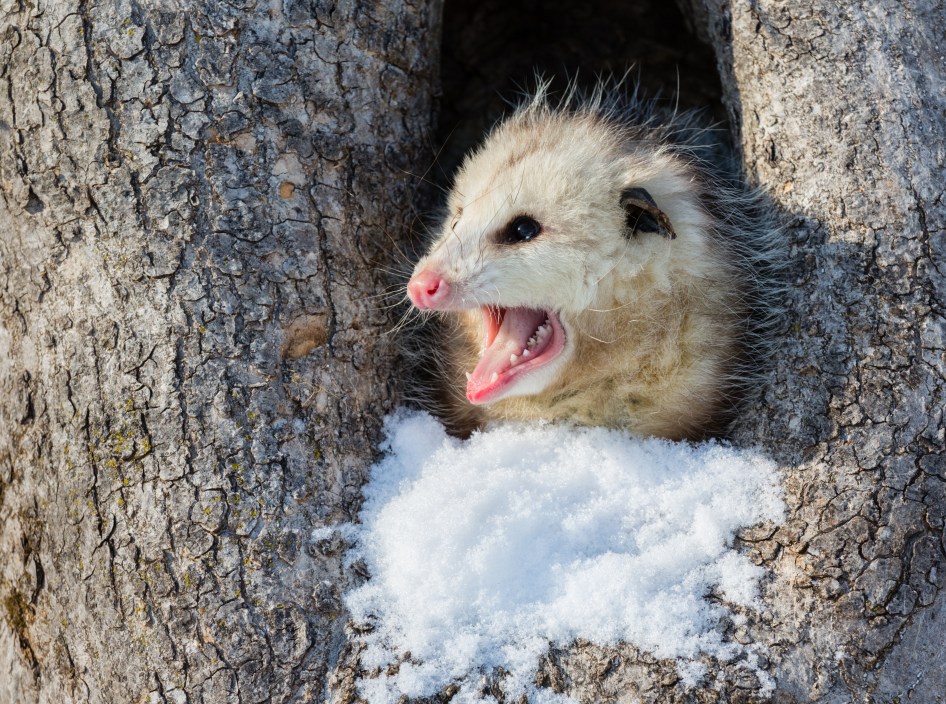A nearly year-long opossum odyssey has (hopefully) come to an end in the tiny town of Homer, Alaska, with the erst-while invasive population re-homed just in time for the holidays.
The saga started back in May, when an opossum appeared where no 'possum had before, right in downtown Homer, a little Alaska fishing town infamous for its quirkiness. While an opossum roaming a town isn't typically an unusual sight, it certainly is in Alaska, hundreds of miles away from their native range.
Which begs the question: How did the female opossum make it to the Far North?
Apparently, by shipping container. The world-traveling opossum was a stowaway, originally from Washington state.
No one's exactly sure where in Washington the opossum boarded the shipping container, but it wound up at Spenard Builders Supply in Homer, Alaska on March 30. Employees unloading the container spotted the hitchhiker in the back. The employees, correctly recognizing the opossum was hundreds of miles north of where it should be, called a local animal shelter, who called Alaska Department of Fish and Game (ADFG). In the meantime, the opossum booked it out of the shipping container.
The hunt for the outlaw opossum was on.
Homer's residents, likely suffering from a little cabin fever after a long winter, quickly made the opossum a mascot-of sorts. They nicknamed her Grubby, after the street she was found near, Grubstake Avenue. Memes abounded, a campaign popped up to #FreeGrubby, and several local news stations began running updates on Grubby's saga. Poems were written, Grubby's face was superimposed onto a well-known local mountain, and there were a few calls for "Grubby for Mayor!" (Furry mayors are not without precedent in Alaska; Talkeetna has had cat-mayors for over 20 years.) Locals could get discounts on game cameras at AC/DC local supply by mentioning "Save Grubby" at the counter, and the local ax-throwing business offered 20% off to those who mentioned the opossum. Even the local Homer Police Department joined in on the fun.
However, not everyone was on board with having Grubby rule the town. While Grubby didn't seem to be causing any immediate harm, the problem, for both Grubby and Homer, was that opossums aren't native to Alaska. Not only was Grubby a stowaway, but she was an invasive one.
Alaska, despite being hundreds of miles north of opossums' normal range, is not a difficult place for them to thrive, especially in the summer. In Homer, there was plenty of food and warm weather for Grubby to establish herself, leading wildlife officials to worry that she, and other opossums like her, could quickly become an invasive species, out-competing local flora and fauna and spreading new diseases. Because opossums will eat just about anything, they could put local Homer wildlife like nesting birds, shrews, and ermines at risk by devouring all of their food and essentially starving them out.
The Homer Police Department and ADFG, keen to catch the opossum quickly, set live traps and requested tips from the locals. But Grubby was wiley, evading capture and giving the ADFG the runaround for two months before she was finally apprehended in May.
The Homer Police Department celebrated the success in a Facebook post, writing "Officer Crowder observed a wanted fugitive and somewhat local celebrity on the lam near Lakeside Drive and Smokey Bay [...] Officer Crowder, without any fear or hesitation, attempted to apprehend the suspect, who then let out a little hiss and growl and bit our officer in the hand. After some very effective de-escalation, the suspect was contained and taken into custody without further incident. It was transported to the Homer Jail via a very comfortable Rubbermaid trash can."
Originally slated for euthanasia, Grubby was instead relocated to a zoo in Anchorage, possibly because carrying out her death sentence would have sparked riots in Homer. She maintained her celebrity status, and stickers made in her honor are still being sold by the zoo with proceeds going, of course, to Grubby's continuing care. Locals and wildlife officials alike thought the opossum-ordeal was over.
But it had only just begun.
Grubby had, in fact, been pregnant.

Lori Stackhouse, Alaska Zoo
Baby Grubbys (opos-sons, if you will) began popping up at Homer's City Hall this past summer, and soon, little opossum joeys began taking over the town. Opossums are capable of having enormous litters, and even a handful of joeys on the loose could explode into an invasive population. Thankfully, though, Grubby hadn't passed on her Houdini-ways to her children, and ADFG had an easier time catching the baby opossums than they did their mother.
In the end, five joeys were caught, though there's no way to know if that's the entire brood. Jason Herreman, a wildlife biologist at ADFG, isn't resting easy yet. He told Alaska Public Media that opossums usually have eight or nine joeys. "No matter what, unless we catch 13 of 'em, I wouldn't ever really be comfortable to say we got them all."
After spending some months in the Alaska Zoo, all five joeys are being sent to different zoos. Homer, named after the town he was born in, was the latest to arrive at his new home, just in time for the holidays. He was shipped to the Portland Zoo, where he made his YouTube debut in early December. He's joining the zoo's Animal Ambassador program and has an important job ahead of him. He'll be acclimated to noisy environments, and visitors will be able to get much closer to him than in a normal exhibit, giving them better insight into his behavior. It's hoped that he will help tackle misconceptions the public might have about opossums.

The Alaska Zoo, Facebook
It's not just in Alaska that opossums have a bad rap. Many people see them as varmints and associate them with disease and garbage. Their rather creepy appearance doesn't help matters. But in their native ranges, opossums are vital members of the food chain and rather neighborly to have around your home. As scavengers, opossums are the clean-up crew, eating up all of the things that other creatures don't want, including pests like mice, slugs, beetles, and cockroaches.
Best of all, they're basically tick-vacuum cleaners. Research has shown that just one opossum eats, on average, 5,500 ticks per week. With tick populations booming thanks to climate change, this is great news for anyone concerned about Lyme disease. Which, given that the number of cases in the United States has doubled since 2000, should be all of us. In fact, we may all be chanting "Grubby for President" in the near future.
READ MORE: How Opossums Eat Thousands of Ticks Per Season




